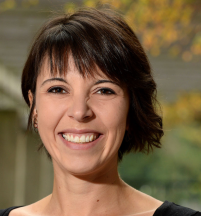Emanuela Struffolino
speaks about self-reported health among lone mothers. Do employment and education matter?

Emanuela Struffolino is postdoctoral fellow of the Research Unit "Demography and Inequality" at WZB - Berlin Social Science Center. She earned a PhD in Sociology in 2014 at the University of Milano-Bicocca. She has been awarded the journal Population’s first Young Author’s Prize
(Interview conducted in March 2016)
Why did you decide to work on lone mothers?
Single-parent households are an interesting subject from the perspective of family sociology and social inequalities for many reasons. Even if the share of men who raise alone one or more children below the age of 18 is increasing as a consequence of the diffusion of the shared custody, lone parents are mostly women. However, their socio-economic profile has become more heterogeneous in the recent cohorts. In fact, the age range at which women experience the transition to lone motherhood has become wider and the distribution of lone mothers across educational levels has increased. These chances can be traced back to the increase in divorce and separation that now are coupled with first biths out of partnership and widowhood as reasons for experiencing lone parenthood. As a consequence, lone mothers’ engagement in paid work has become more diverse due to varying degrees of labor market attachment for different educational groups. Lone mothers are at high risk of suffering from poor health and are more likely to be unemployed and live in poverty, which are both factors associated with poor health. However, the additional burdens to the reconciliation of family and work can as well trigger additional disadvantages in different life domains for lone mothers who are main/sole breadwinners and caregivers.
Does Switzerland - where your survey took place – display specific characteristics?
Switzerland is an extremely interesting case study, because of the weak work-family reconciliation policies and marriage-based taxation that discourage female labor market participation. The level of public spending for early childhood care in Switzerland is one of the lowest in OECD comparisons, and translates into the parents being required to bear more than 80% of the costs even in public childcare (even though differences exist among Cantons). Relatively widespread welfare schemes against poverty can affect lone mothers’s labor market participation in two ways: either they represent a buffer against immediate and urgent economic needs or they may discourage lone mothers from taking on paid work with unfavorable labor market prospects. In particular, lone mothers face great difficulty in accessing full-time paid care to keep a low paying job, either because of lack of childcare places or because of high costs. Relying on social assistance may appear to be a good strategy, especially for less-educated lone mothers, to optimize scarce economic and time resources in the short run. However, depreciation of both social capital and skills during long periods of unemployment can undermine future employability prospects. In this context, for lone mothers employment can be associated with better health because it eases the potential economic hardship driven by being the principal earner. However, working can represent an additional stress factor due to lone mothers’ responsibility as sole/main caregiver.
What is the link between health and (un)employment for lone mothers in Switzerland ?
We found that in the Swiss context lone mothers, especially those who do not work, have poorer health than partnered mothers. This association is partially explained by the fact that lone mothers tend to have a lower income. Our results suggest that in Switzerland while financial provision and support are ensured for the weakest mothers heading a single-parent household, those who are less likely to rely on welfare support and at the same time have a low level of bargaining power on the labour market compared to highly educated (signalled by their part-time participation and relatively poor qualifications) represent a potentially vulnerable group suffering from specific health disadvantages. Future research shall explore to which extent such effects are driven by the institutional, financial, social, and time resources available to lone parents to fulfil their double role and by the uncertain prospects in the labour market.
